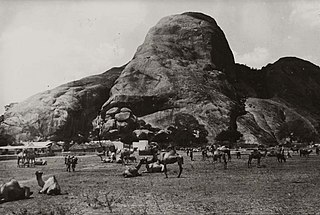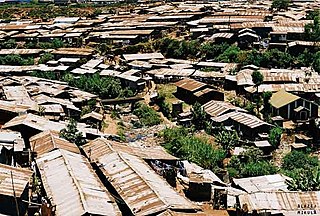
Somalia, officially the Federal Republic of Somalia, is a country in the Horn of Africa. It is bordered by Ethiopia to the west, Djibouti to the Northwest, the Gulf of Aden to the north, the Indian Ocean to the east, and Kenya to the southwest. Somalia has the longest coastline on Africa's mainland. Its terrain consists mainly of plateaus, plains, and highlands. Hot conditions prevail year-round, with periodic monsoon winds and irregular rainfall. Somalia has an estimated population of around 15 million, of which over 2 million live in the capital and largest city Mogadishu, and has been described as Africa's most culturally homogeneous country. Around 85% of its residents are ethnic Somalis, who have historically inhabited the country's north. Ethnic minorities are largely concentrated in the south. The official languages of Somalia are Somali and Arabic. Most people in the country are Muslims, the majority of them Sunni.

Gedo is an administrative region (gobol) in Jubaland, southern Somalia. Its regional capital is Garbahaarreey. It was created in 1974 and is bordered by the Ogaden in Ethiopia, the North Eastern Province in Kenya, and the Somali regions of Bakool, Bay, Jubbada Dhexe, and Jubbada Hoose further down east. The southern parts of Gedo, west of the Jubba River, used to be part of the old British Trans-Juba region during half of the seventy years of colonial era in Africa from 1890 to 1960. The British and Italians fought twice over this area. The first democratically elected governor of the administrative region was Hussein Farey, who entered office in 2008.

Bardera is an agricultural city in Bardhere District, Gedo region of Somalia. It is the second largest and most populous town in Jubbaland with Kismayo being the largest and most densely populated city in the region, and Garbahaarreey serving as Gedo's capital. Bardera sits on the Jubba River around 250 km west of the city of Baidoa and is in a highland area with fertile soil. The city experiences extremely hot temperatures from December to April and heavy rainfalls from April to May knowns as Gu (spring) The city was formerly known as the "Onion capital of the World" for its production of the vegetable, the name Bardera means tall palm trees. The palms were cut to construct native homes or midille. The city is famous for its fruit and vegetable production as well as cereals such as maize.

Burhakaba is a town located in the Bay region in Somalia.

Founded in 2001 by Rye Barcott, Salim Mohamed, and the late Tabitha Atieno Festo, Carolina for Kibera is an international non-governmental organization (NGO) based in the informal settlement of Kibera in Nairobi, Kenya. Registered as an NGO in Kenya and a 501(c)3 in the US, CFK is a pioneer of grassroots participatory development, and leads a community-based sports program, girls' empowerment centre, medical clinic, maternity centre, nutrition centre, young health and wellness centre, community-health outreach program, scholarship program, entrepreneurship and economic development initiatives, and a research-based initiative to improve educational quality in informal schools in Kibera. CFK is also an affiliated entity at the University of North Carolina at Chapel Hill and has an office in the university's FedEx Global Education Center.

Embu County is a county of Kenya. The capital of Embu County and the former Eastern province headquarters, Embu is a large and largely metropolitan area with a population of 608,599 persons. The county borders Kirinyaga to the west, Kitui to the east, Tharaka Nithi to the north, Machakos to the south. The county occupies an area of 2,821 km2.
Health advocacy or health activism encompasses direct service to the individual or family as well as activities that promote health and access to health care in communities and the larger public. Advocates support and promote the rights of the patient in the health care arena, help build capacity to improve community health and enhance health policy initiatives focused on available, safe and quality care. Health advocates are best suited to address the challenge of patient-centered care in our complex healthcare system. The Institute of Medicine (IOM) defines patient-centered care as: Health care that establishes a partnership among practitioners, patients, and their families to ensure that decisions respect patients’ wants, needs, and preferences and that patients have the education and support they need to make decisions and participate in their own care. Patient-centered care is also one of the overreaching goals of health advocacy, in addition to safer medical systems, and greater patient involvement in healthcare delivery and design.
Mogadishu University is an accredited non-governmental university in Mogadishu, Somalia.

Education in Somalia refers to the academic system within Somalia. The Ministry of Education is officially responsible for education in Somalia, with about 15% of the nation's budget allocated to scholastic instruction. The breakaway republic of Somaliland maintain its own advanced Ministry of Education.

East Bardera Mothers and Children's Hospital (EBMCH) is a non-profit institution women's and children's hospital located in Baardheere, Somalia. The hospital was started by expatriate Somalis based in North America. The hospital, locally referred to as Isbitaalka Bariga Baardheere, is managed by a team of nurses in addition to one of the most experienced midwives in the Bardera district of the Gedo region.

Bardera Polytechnic is a non-profit tertiary polytechnic education centre located in Bardera, Somalia. The college's full name is Bardera Polytechnic College (BPC). Bardera Polytechnic is the first post-secondary institution in Bardera and the larger Gedo region. Bardera Polytechnic is the first post civil war vocational training school in southern Somalia.
West Bardera Maternity Unit, is a hospital in Bardera, Somalia. Established on December 13, 2008, offers basic women's and children's health services including prenatal, child delivery services, post-partum and child immunization. Bardera has an estimated population of 106,000 and the main Bardera District Hospital is out of service.

Edna Adan Maternity Hospital is a non-profit charity hospital built in Hargeisa, Somaliland. It was founded by the autonomous northwestern Somaliland region's former foreign minister and former first lady of Somalia, Edna Adan Ismail. The hospital has as its primary mission to provide better health care to people whose lives have been traumatized by war, and also to provide training for nurses, midwives, and other health workers. In addition to services and facilities relating specifically to maternal and infant health care, the hospital has diagnostic laboratory facilities and an emergency blood bank, and offers diagnosis and treatment for sexually transmitted diseases.

Abudwak Maternity and Children's Hospital is a health services center in Abudwak, the largest city in Galgadud Region. This maternity hospital was initiated by the Somali diaspora.
Gedo Education Committee or GEC for short is an education service organization which is based in south west Somali region of Gedo.

Bilis Qooqaani is a town in the Afmadow district of the Lower Juba region of southern Somalia. The city is approximately 70 kilometers away from the Kenya-Somali border and has an estimated population of around 55,000 -80,000.
The Somali Red Crescent Society (SRCS) is a non-political, independent humanitarian organization in Somalia and is part of the International Red Cross and Red Crescent Movement.
The Juba Valley Agricultural Institute is an academic institute within the Bardera Polytechnic College in Bardera, Somalia. It is situated within the southern Jubba Valley.
Juba Valley Veterinary Institute or Af Somali Kuliyada Xanaanada Xoolaha ee Dooxada Juba, Arabic:, Italian: Giuba Valle Veterinario Instituto is a veterinary institute in Bardera, Gedo Somalia. The Institute is part of Bardera Polytechnic specialized schools and institutes within the college system.
Healthcare in Somalia is largely in the private sector. It is regulated by the Ministry of Health of the Federal Government of Somalia. In March 2013, the central authorities launched the Health Sector Strategic Plans (HSSPs), a new national health system that aims to provide universal basic healthcare to all citizens by 2016. Somalia has the highest prevalence of mental illness in the world, according to the World Health organization. Some polls have ranked Somalis as the happiest people in Sub-Saharan Africa.